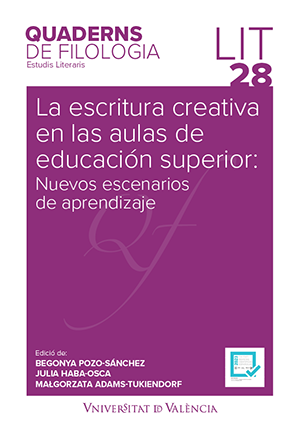Phraseological deautomatisation as a form of creative writing in SFL
DOI:
https://doi.org/10.7203/qdfed.28.26572Keywords:
phraseological unit, deautomatization, creative writing, SFL, written language Abstract
Abstract
The use and behavior of phraseological units often poses a series of difficulties in the SFL classroom due to the creative manipulations carried out by native speakers of a language. In this context, the phenomenon of phraseological deautomatisation by means of semantic modifications arises because of the interplay between figurative and literal reading in specific contexts. On the other hand, the approach of university students to literature can also take place through creative practice. In this sense, creative writing can be an activity of great pedagogical interest since it offers the possibility of artistic expression through language. In response to this interest, the aim of this study is to explore the creative possibilities of language in phraseology. In addition, this study aims to examine a sample of creative writing in phraseological contexts aimed at Russian university students of SFL. For this purpose, a case study methodology is used by analyzing verbal locutions in phraseological deautomatisation contexts. Based on the deautomatisation of phraseology, the aim is to bring students closer to the practice of literary creation, which stimulates language creativity and develops written competence in the production of texts in the target language.
 Downloads
Downloads
Downloads
Published
How to Cite
-
Abstract294
-
PDF (Español)346
Issue
Section
License
 Este obra está bajo una licencia de Creative Commons Reconocimiento-NoComercial-SinObraDerivada 4.0 Internacional.
Este obra está bajo una licencia de Creative Commons Reconocimiento-NoComercial-SinObraDerivada 4.0 Internacional.
Authors who publish with this journal agree to the following terms:
- Authors retain copyright and grant the journal right of first publication with the work simultaneously licensed under a Creative Commons Attribution License that allows others to share the work with an acknowledgement of the work's authorship and initial publication in this journal.
- Authors are able to enter into separate, additional contractual arrangements for the non-exclusive distribution of the journal's published version of the work (e.g., post it to an institutional repository or publish it in a book), with an acknowledgement of its initial publication in this journal.
- Authors are permitted and encouraged to post their work online (e.g., in institutional repositories or on their website) prior to and during the submission process, as it can lead to productive exchanges, as well as earlier and greater citation of published work (See The Effect of Open Access).



